- An attempted coup occurred every 2.8 seconds in Brazil last year, totaling more than 11.5 million occurrences, an increase of 9.4%;
- Device intelligence grew 31.8% in identifying scams
In 2024, Brazil recorded 11,509,214 attempted frauds, an increase of 9.4% compared to the previous year. This is equivalent to one occurrence every 2.8 seconds. Considering the breakdown by age group, although most of the attempts occurred among Brazilians aged 36 to 50 (33.4%), the biggest increase was in attacks targeting seniors over 60 (11.9%).
The data comes from the Fraud Attempt Indicator from Serasa Experian, the first and largest datatech in Brazil, and refers to cases avoided by technologies capable of authenticating users. See the graph below for the evolution of the accumulated total in 2024 and the comparison with the previous year. Then, check out the table with the analysis by age group: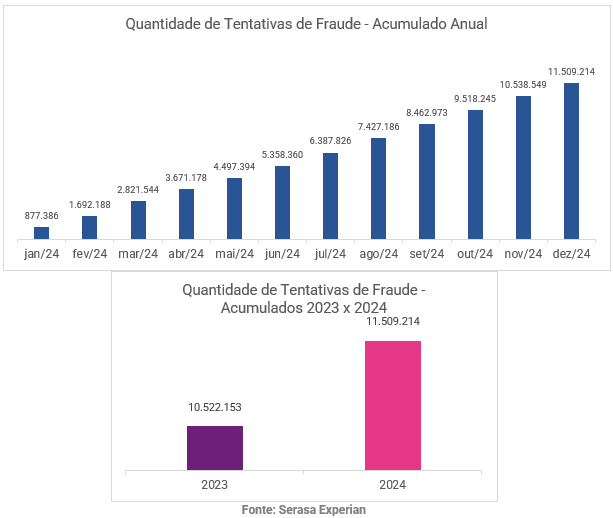
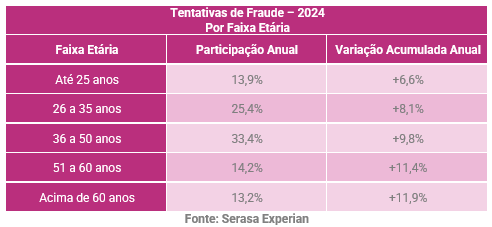
According to Caio Rocha, Director of Authentication and Prevention at Serasa Experian, the growth of these attacks reflects the sophistication of digital attacks and the ongoing need to improve prevention tools. “Data analysis and the use of technology are essential to mitigate these risks. Fraudsters are increasingly active and constantly improving their tactics, making prevention an ongoing challenge. Solutions such as those developed by the datatech, dedicated to applying layers of authentication, are becoming essential to anticipate and block threats before they cause harm to consumers and companies.”
Device intelligence mitigates fraud attempts
The more than 11 million fraud attempts were prevented through authentication technologies, such as device intelligence, which played a key role in identifying fraud in 2024, preventing more than 900,000 scams. This type of occurrence intensified throughout the year, registering a growth of 31.8%.
Despite this technological advancement, most fraud attempts (58.2%) were detected due to inconsistencies in registration information. These discrepancies occur when the data provided by users differs from the information registered in reliable or official databases, such as CPF, address, date of birth and financial history. Often, such irregularities indicate the creation of false identities, manipulation of existing data or the misuse of third-party information.
Furthermore, fraudulent patterns related to document authenticity and biometric validation accounted for 33.6% of occurrences throughout the year, reinforcing the need for integrated solutions to combat different strategies used by fraudsters.
Overview by Federative Units: Rio Grande do Sul had the highest percentage increase, but the Southeast remains the main target
The Serasa Experian Fraud Attempt Indicator also revealed that, in 2024, all Federative Units (UFs) registered an increase in occurrences, ranging from 7.1% to 12.7%. Mato Grosso had the highest percentage increase in the period, totaling 252,533 scam attempts identified between January and December.
Despite the widespread growth, the Southeast region remained the most targeted, accounting for 47.6% of occurrences across the country. São Paulo, for example, recorded a fraud attempt every 10 seconds, totaling 3,181,644 cases throughout the year and consolidating itself as the state with the highest absolute volume. See below the graph with the total number of records in the year and the percentage increase by state compared to 2023: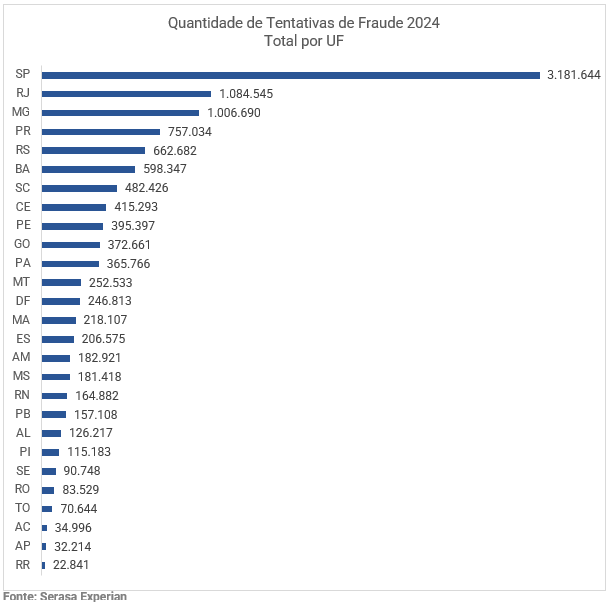
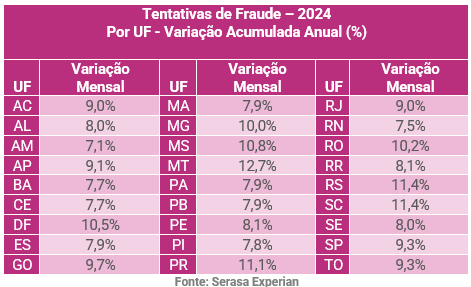
Rocha emphasizes that continuous investment in innovation and education is essential to anticipate and neutralize fraud threats. “Fighting fraud requires a balance between advanced technology and a safe user experience. Combining smart solutions with awareness strategies is essential to make it harder for scammers to act and strengthen the protection of digital identities,” says the director.
Monthly view: Fraud declines for second consecutive month, but still exceeds 2023
In December 2024, Brazil registered 970,665 fraud attempts, an increase of 13.4% compared to the same month in 2023. However, compared to November, there was a drop of 4.9%, a trend observed in all Federative Units (UFs) and which had already been taking shape since the previous month.
In the analysis by segment, frauds in “Banks and Cards” fell by 8.4% compared to November, representing 50.8% of the month’s occurrences. In contrast, the Retail sector registered an increase in due diligences of 7.6%, indicating that fraudsters adjust their strategies according to the opportunities and barriers found in the market. See below a graph with the total fraud attempts avoided monthly in the year 2024: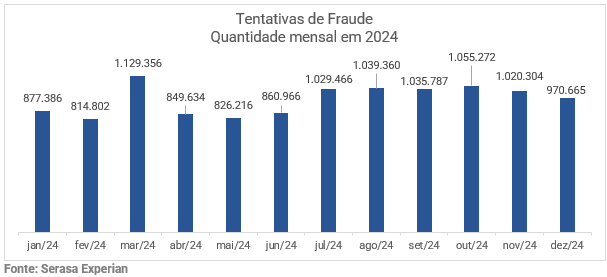
Avoid fraud: see tips from Serasa Experian experts to protect yourself
Consumers:
• Ensure that your documents, cell phone and cards are safe and have strong passwords to access applications;
• Be wary of offers for products and services, such as travel, with prices that are well below market value. At such times, it is common for cybercriminals to use the names of well-known stores to try to hack into your computer. They use emails, SMS messages and website replicas to try to collect information and credit card details, passwords and personal information from the buyer;
• Be careful with links and files shared in social media messaging groups. They may be malicious and direct you to unsafe pages that contaminate devices with commands to operate without the user noticing;
• Register your Pix keys only on official bank channels, such as banking apps, Internet Banking or branches;
• Do not provide passwords or access codes outside the bank's website or application;
• Do not make transfers to friends or relatives without confirming by phone or in person that it really is the person in question, as the person's contact may have been cloned or falsified;
• Only include your personal information and card details if you are sure that this is a secure environment;
• Monitor your CPF frequently to ensure that you have not been a victim of fraud.
Companies:
• Invest in fraud prevention technologies to protect the integrity and security of your company’s operations.
• In an increasingly digital and interconnected business environment, where fraud evolves and expands rapidly, layered fraud prevention is not just a good practice, but a strategic necessity;
• Ensure the quality and veracity of data from fraud prevention solutions using solutions that are constantly improved in the face of changes and fraud threats;
• Deeply understand your user profile and constantly seek to minimize friction points in their digital journey, ensuring a fluid experience without compromising security.
• Use fraud prevention as a lever to generate revenue, implementing an intelligent orchestration of solutions that maximize security, reduce losses and enable a more agile and reliable purchasing experience for the customer.
Methodology
The Serasa Experian Fraud Attempts Indicator – Consumer is the result of crossing two sets of information from the Serasa Experian databases: 1) total CPF consultations carried out monthly at Serasa Experian; 2) estimation of the risk of fraud, obtained through the application of probabilistic fraud detection models developed by Serasa Experian, based on Brazilian data and global Experian technology already consolidated in other countries. The Serasa Experian Fraud Attempts Indicator – Consumer is constituted by multiplying the number of CPFs consulted (item 1) by the probability of fraud (item 2), in addition to adding the volume of fraud attempts registered by the company relating to document verification, facial biometrics and registration verification.
Serasa Experian
Serasa Experian is the first and largest Datatech in Brazil. A leader in intelligence solutions for analyzing risks and opportunities, focusing on credit journeys, authentication and fraud prevention. With cutting-edge technology, innovation and the best talent, it transforms the uncertainty of risk into the best decision, helping people achieve their dreams and companies of all sizes and segments to prosper.
Created in 1968, Serasa became part of the Experian Company in 2007, a global company headquartered in London. It is currently responsible for more than 6.5 million daily queries about companies and consumers and protects more than 2.2 billion commercial transactions every year.
Empowers consumers with financial education, facilitating access to fair credit. Helps companies of all sizes and segments to make better decisions, on several fronts to: find new customers, manage current ones more efficiently, grant credit or sell on credit safely, comply with ESG standards, authenticate its customers and prevent fraud, and also charge them at the ideal time, without impacting the relationship.
With the purpose of creating a better future for everyone by expanding opportunities for people and companies, the company trains people in the technology area and promotes small businesses and startups with social impact through its own free programs. It is considered a LinkedIn Top Company and one of the best companies to work for, recognized by GPTW. It is also the most innovative service company in the country, certified by the Valor Inovação Brasil Award.
expert
Experian is a global data and technology company that creates opportunity for people and drives businesses around the world. We facilitate credit journeys, authenticate and prevent fraud, streamline healthcare processes, provide digital marketing solutions, and help drive insights for the automotive industry, all using innovative combinations of our data, analytics, and software. We also help millions of people achieve their financial goals and save time and money.
We operate in a variety of markets, going beyond financial services and operating in the automotive, agribusiness, healthcare, insurance and many other industry segments. To continue innovating, we invest in talented people and advanced technology to unlock the power of data.
Headquartered in Dublin, Ireland, we are a FTSE 100 company listed on the London Stock Exchange (EXPN) and have a team of 22,500 people across 32 countries. Find out more at experianplc.com.













